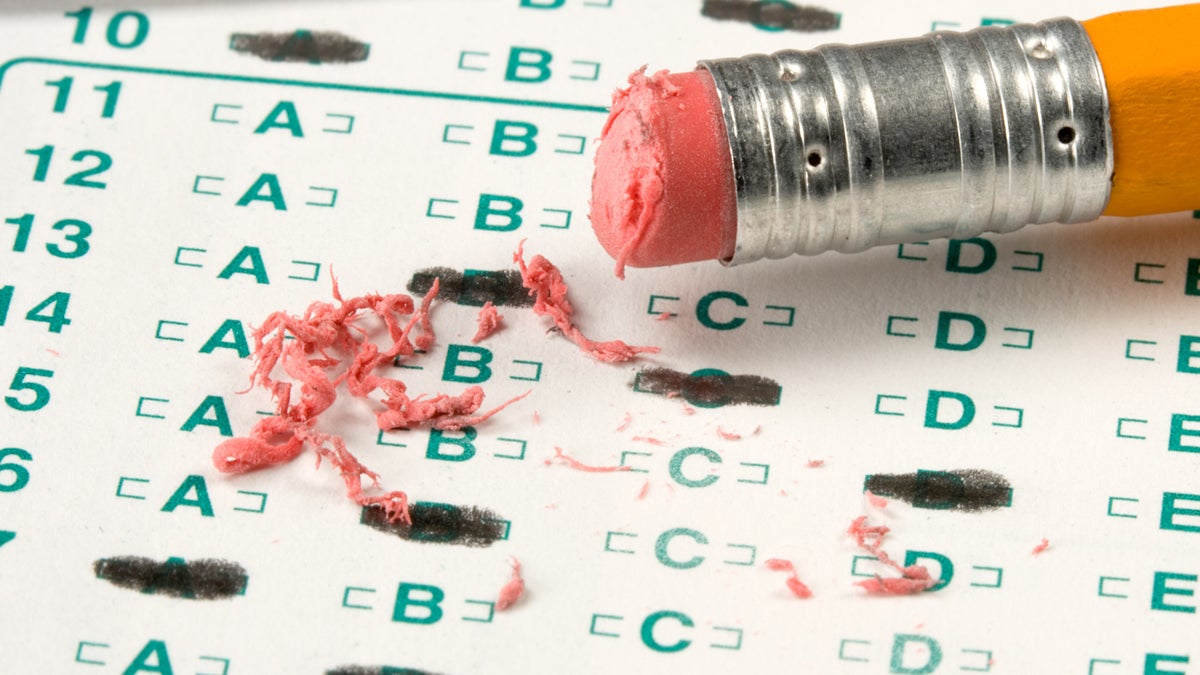Lower PSSA scores spur some Pa. school districts to call for less testing

(Photo via ShutterStock)
Last month, the Pennsylvania Department of Education shared preliminary test data for its new, common core aligned tests – and the results weren’t pretty.
As a result, some area school districts are lobbying Harrisburg to dial back the number and consequences of standardized tests, sooner rather than later.
Pottsgrove School Board Director Rick Rabinowitz said the new scores make it hard to gauge school progress.
“The trend was up for most of our schools. And we’d been working very hard to continue to improve,” said Rabinowitz. “It’s like pulling the rug out from under us.”
In response, Pottsgrove passed a resolution asking legislators to “minimize the amount of mandated testing,” and urging its own faculty and administrators to stay focused on “quality teaching of quality content, and to minimize time spent on preparation for standardized testing.”
Rabinowitz said he is also worried about how lower scores will affect teachers, who are evaluated partially on test scores and progress.
Based on the Pennsylvania Department of Education’s preliminary data for last year’s PSSAs — reading, math and writing tests administered to third- through eighth-graders — show an average drop in test scores across the board. For math, the test scores declined an average of 35.4 percent across those grades.
In addition to changing questions on the tests to align with Pennsylvania Common Core standards, state officials changed the “cut scores” — or what score constitutes a passing grade. Some administrators argue this unfairly deflates scores. The department has said comparisons with previous years are moot and this year should be treated as a baseline.
Rabinowitz said, in some cases, different state tests contradict each other. For seventh-graders in the district taking the math PSSA and the algebra Keystone exam, “we didn’t have any students who scored ‘advanced’ on that Keystone exam that also scored ‘advanced’ on the PSSA,” he said. “Which is stark because these are the best of the best” for their age group.
West Chester Superintendent Jim Scanlon said his district is already feeling the effects of more testing and lower scores.
“We have had parents withdraw their kids and send them to private schools,” due to the increased emphasis on testing, he said.
As a part of administering the Keystone exams — which will become a graduation requirement starting with the Class of 2017 — Scanlon said his district is spending $600,000 a year on extra staff to teach remedial math and biology. Students who fail the exams must take remedial courses and pass a project-based assessment instead, requiring extra coursework and, in some cases, less time for elective classes.
Appearing before the House Education Committee earlier this summer, Scanlon criticized the steep drop in PSSA scores and calling for accountability measures that are more holistic and consider students on a technical track. He is also one of 55 Philadelphia area superintendents — out of the total 63 districts — who raised questions about the Keystone requirements and cost two years ago.
Scanlon said he hopes it won’t take until 2017 to change the tests — and anticipates possible movement after the state passes a budget.
“Let’s make the change. Let’s keep the decision local,” he said.
Earlier this year, a the Senate unanimously passed a bill delaying when the Keystone Exams would take effect as a graduation requirement for two more years, until 2019. But, that bill has not been brought to vote in the House. Gov. Tom Wolf has said he supports exploring different options for standardized testing, but that accountability must remain.
WHYY is your source for fact-based, in-depth journalism and information. As a nonprofit organization, we rely on financial support from readers like you. Please give today.




